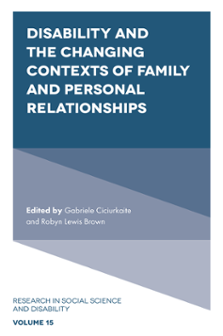
Index
Disability and the Changing Contexts of Family and Personal Relationships
ISBN: 978-1-83753-221-6, eISBN: 978-1-83753-220-9
ISSN: 1479-3547
Publication date: 10 June 2024
Citation
(2024), "Index", Ciciurkaite, G. and Brown, R.L. (Ed.) Disability and the Changing Contexts of Family and Personal Relationships (Research in Social Science and Disability, Vol. 15), Emerald Publishing Limited, Leeds, pp. 217-222. https://doi.org/10.1108/S1479-354720240000015014
Publisher
:Emerald Publishing Limited
Copyright © 2024 Gabriele Ciciurkaite and Robyn Lewis Brown. Published under exclusive licence by Emerald Publishing Limited
INDEX
- Prelims
- Introduction to the Volume: Toward an Understanding of Disability and the Changing Contexts of Family and Personal Relationships
- Chapter 1 Disability, Family, Artistry: A Search for Balance and Access
- Part I Vulnerability and Dependency
- Chapter 2 From the Coleman Case to Disability Justice: An Examination of Discrimination by Association
- Chapter 3 Household Structure, Loneliness, and Food Insufficiency Among Working-Age Adults With Disabilities During the COVID-19 Pandemic
- Chapter 4 The Commodification of Care: Precarious Custodial Relationships, Disability, and Settler-Colonialism
- Part II Embodiment and Care
- Chapter 5 Experiences, Interpretations, and Cultural Representations of Type 1 Diabetes and Their Effects on Individual Reproductive Trajectories
- Chapter 6 Social Services and Support Structures for Adults With Autism Spectrum Disorder (ASD) and Their Parents' Quality of Life in Cyprus
- Chapter 7 The Role of Emotion in Caregiving Information Processing and Sensemaking for Parents of Children With Intellectual and Developmental Disabilities
- Chapter 8 The Meaning of Disability and Family in American Medicine: A Content Analysis of the Intersection of Disability and Family in the AMA's Proceedings From 1846 to 2022
- Part III Identity and Creativity
- Chapter 9 Family-Centered Decision-Making About Type 2 Diabetes Mellitus Among Koreans
- Chapter 10 Beyond Complicity or Allyship: Toward a New Understanding of Caregivers
- Chapter 11 Sense and Sensuality: A Call for a Crip Dialogue Moving Beyond the Language of “Sexual Health” and “Healthy Sexualities”
- Index